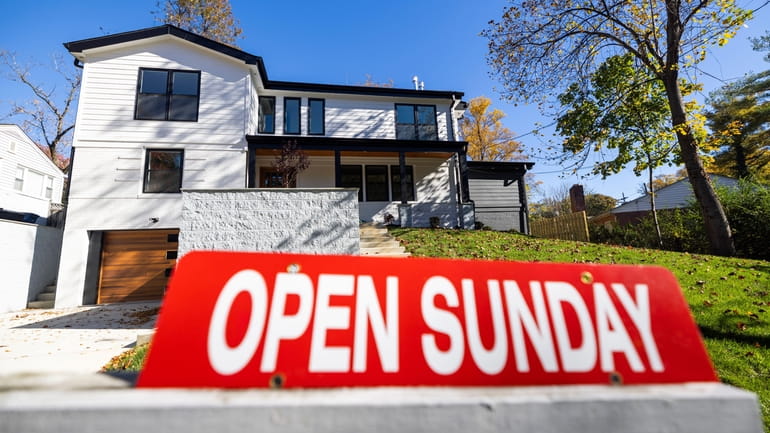Average U.S. mortgage rate falls to 6.95%

A "For Sale" sign outside a single-family home in Bethesda, Md. Credit: EPA / Jim Lo Scalzo
The average U.S. mortgage rate for long-term home loans retreated this week to 6.95%, moving lower after it had surpassed 7% last week, according to mortgage giant Freddie Mac.
The average declined after three straight weeks when rates moved higher, sliding from last week’s average of 7.08%, which was the highest since 2002. The weekly gauge is more than double the level from a year ago, when it stood at 3.09%.
Greg McBride, chief financial analyst at Bankrate, cautioned homebuyers to not put too much stock into the one-week decline. He said he expects the 30-year fixed mortgage rate to average between 7% and 7.25% in November.
"There's nothing in place that would suggest a meaningful decline in mortgage rates," McBride said. "At the point where inflation is on an unmistakable trend lower [and] the economy is slowing, at that point mortgage rates will fall. But that is not imminent. It might be in the cards for 2023."
Persistent inflation has helped drive the steepest increase in mortgage rates since the early 1980s, with the Federal Reserve’s policies aimed at slowing down the growth in consumer prices sending mortgage rates higher.
Mortgage rates don’t follow the Fed’s every move directly. For example, the average moved lower this week even as investors anticipated the Fed’s 0.75 percentage-point increase in its benchmark increase rate Wednesday. Mortgage rates more closely follow the movement of the yield on the U.S. 10-year Treasury note.
Fast-rising rates have led some homebuyers to postpone a purchase while others can no longer afford to buy because of higher interest costs, Sam Khater, Freddie Mac’s chief economist, said in a statement.
“[Wednesday’s] interest rate hike by the Federal Reserve will certainly inject additional lead into the heels of the housing market,” he said.
On Long Island, rising rates contributed to a 22% drop in the number of home sales in September, while prices have remained near record highs, in part, because of a shortage of houses on the market.
Jerome Powell, chair of the Federal Reserve, acknowledged Wednesday that the Fed’s actions have had a significant — and desired — effect on housing demand.
“The housing market was very overheated for the couple of years after the pandemic as demand increased and rates were low. We all know the stories of how overheated the housing market was — prices going up, many, many bidders, no conditions, that kind of thing,” Powell said during a news conference. “The housing market needs to get back into a balance between supply and demand.”

Updated now Newsday travel writer Scott Vogel took the ferry over to Block Island for a weekend of fun.

Updated now Newsday travel writer Scott Vogel took the ferry over to Block Island for a weekend of fun.

